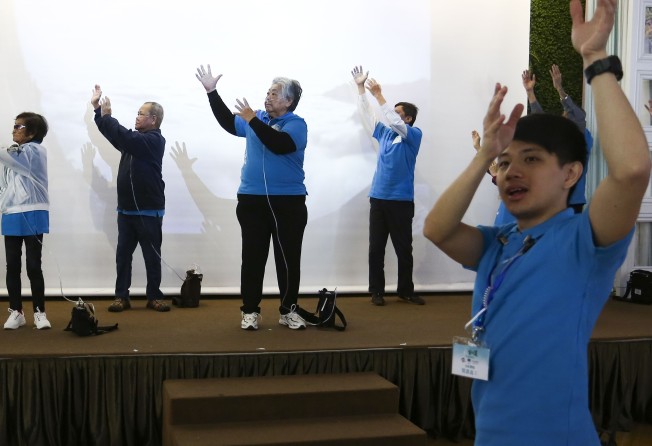Lung disease patients call for oxygen tanks to be allowed on Hong Kong public buses
They argue that regulations are outdated and lack of awareness means they face discrimination

Sufferers of a chronic lung disease are urging the Hong Kong government to lift restrictions on oxygen tanks being carried on buses, saying current regulations are discriminatory and affect their freedom of movement.
Chow, 63, who did not want to reveal his first name, is a former construction worker and smoker and one such patient. He was diagnosed with chronic obstructive pulmonary disease (COPD) six years ago.
Two years back, he started requiring the full-time use of an oxygen cylinder as his lungs could only function at 20 per cent of full capacity.
The disease restricts air flow in and out of airways in the lungs, causing shortness of breath.
“I was once told to get off the bus because of my cylinder. I then hid my cylinder and got on the next bus. But it was very difficult for me so I [secretly] took out the cylinder and took a breath or two. I felt embarrassed,” he said.
COPD is the eighth most severe disease in Hong Kong and 140,000 people have medium to severe symptoms. More than 6,000 patients require an oxygen cylinder or concentrator. Every year the disease kills 1,400 people – about four a day.
The lung disease typically affects smokers, construction workers and people exposed to second-hand smoke.
Patients who require an oxygen tank to aid their breathing are limited in mobility by the capacity of their tanks and how quickly they use up the oxygen.
Chow only goes out once or twice a week, mainly to see a doctor. Current regulations do not allow oxygen cylinders to be brought onto public buses.
But patients generally prefer taking the bus because of point-to-point travel, which requires less time for them.
In a survey of 188 COPD patients, 25 per cent said they did not leave their homes for over a week because the MTR – which allows certain sizes of cylinders on trains – was too far away and they worried they would run out of oxygen.
“I believe the reason for the regulation was because smoking was allowed on buses in the past, and it was dangerous to bring a cylinder on board, but since people are not allowed to smoke any more the risk is very low,” transport sector lawmaker Frankie Yick Chi-ming said at an event urging the government to lift restrictions. “The regulation is outdated.”
Yick added that the government had told him that an amendment would be tabled by the end of this year or early next year.
Attempts to have the amendment passed since 2012 had failed under the previous administration due to filibustering, according to health services sector legislator Joseph Lee Kok-long.
Lee said he hoped the same fate would not befall the amendment under the new government of Chief Executive Carrie Lam Cheng Yuet-ngor.
COPD sufferers said they have also experienced discrimination because of a lack of knowledge about the disease.
Chow has encountered people shunning him because they thought he had an infectious disease.
“One man shouted at me to go away,” he said.
Dr Ng Chun-kong, president of the Chest Delegation Hong Kong and Macau – the earliest professional society of respiratory medicine in the city – said focus on other high profile diseases had caused COPD to be overlooked in public education.
He said the use of oxygen tanks by patients would become more common in Hong Kong as the population aged and life expectancy increased.